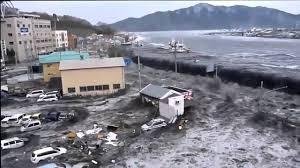 tsunami, from the Japanese tsu nami (津 波?, "Port wave"), is a series of waves of very large period propagating through an aquatic environment (ocean, sea or lake [1]), coming from the abrupt movement of a large volume of water, generally caused by an earthquake, an underwater landslide or a volcanic explosion, and which can be transformed, reaching the coast, into breaking destructive waves of very great height [2] .
tsunami, from the Japanese tsu nami (津 波?, "Port wave"), is a series of waves of very large period propagating through an aquatic environment (ocean, sea or lake [1]), coming from the abrupt movement of a large volume of water, generally caused by an earthquake, an underwater landslide or a volcanic explosion, and which can be transformed, reaching the coast, into breaking destructive waves of very great height [2] .
In deep water, the waves of the tsunami have a period (time separating each ridge) counting in tens of minutes, and can travel at more than 800 km / h, while not exceeding a few decimetres of height. But at the approach of the coasts, their period and their speed decrease, while their amplitude increases, their height being able to exceed 30 m [2]. They can then submerge the shoreline, flooding the lowlands, penetrating deep into the land, carrying everything in their path, in a succession of ebb and flow.
Tsunamis are among the most destructive disasters in history. Over the last four millennia, they total more than 600,000 victims, through at least 279 events listed [2]. The 2004 Indian Ocean tsunami is the deadliest disaster of the last 30 years, with more than 250,000 casualties